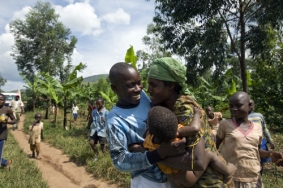
A young man, who was separated from his family by the war in the Democratic Republic of the Congo, is reunited with his loved ones.
Conflict and disasters leave more than physical wounds: in the turmoil, panic and terror, family members can be separated in minutes, sometimes leading to long years of anguish and uncertainty about the fate of children, spouses or parents. Trying to locate people, and put them back into contact with their relatives, is a major challenge for the ICRC and the national Red Cross and Red Crescent societies. The work includes tracing people, exchanging family messages, reuniting families and seeking to clarify the fate of those who remain missing.
The ICRC’s work to restore family links goes back to 1870, when it obtained lists of French prisoners held by German forces, and could then reassure the families. Since then, tracing people separated by conflict and disaster has become a major part of the ICRC’s protection work and involves the international Red Cross and Red Crescent Movement in a global network.
The work has an established basis in international humanitarian law, which requires that authorities involved in armed conflict do everything possible to help separated family members to restore contact. The ICRC’s Central Tracing Agency and its partners may offer to help meet these obligations; but very often they take on the practical work themselves, dealing with all sides in strict neutrality.
Separation has many causes. When fleeing a conflict or natural disaster, children may lose their way in the chaos. Elderly or sick people may not want – or be able – to leave their homes. Injured people may be evacuated to hospitals without their loved ones knowing what has happened to them. People may be arrested and detained, leaving their relatives without any idea where they are.

After the earthquake in Haiti, the ICRC helped people re-establish contact with relatives via satellite phone.
Vulnerable groups requiring priority treatment include unaccompanied and separated children, the elderly, the injured, disabled and chronically sick. In recent years, certain categories of migrants and their families have also needed help to trace a relative and get back into contact again.
Restoring family links involves a range of activities. These include putting people in contact by telephone, internet and hand-written messages. They frequently entail tracing persons who are unaccounted for and registering particularly vulnerable people such as children who have been separated from their families and people being held in detention. In many cases, the work involves collecting information about people who are missing and possibly dead. When all goes well, the activities result in families being reunited with their loved ones.
The right to know
International law includes several provisions prohibiting forced disappearances and gives families the right to be informed of the fate of their missing relatives. But in emergencies the ICRC has to take immediate steps on the ground to try to find out what has happened to people. These measures include visiting prisoners and detainees (around half a million every year) and seeking information in any place that might give a lead.
At the same time the ICRC encourages authorities to give the transmission of family information higher priority and offers technical advice for doing so. It also tries to ensure that the families of missing people, who live in extreme emotional anguish because of the uncertainty surrounding their loved ones, receive adequate psycho-social support during their long wait for answers and, eventually, closure.
Source: icrc.org






